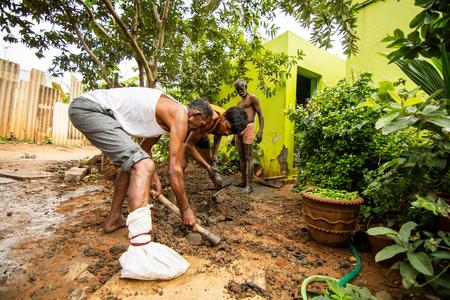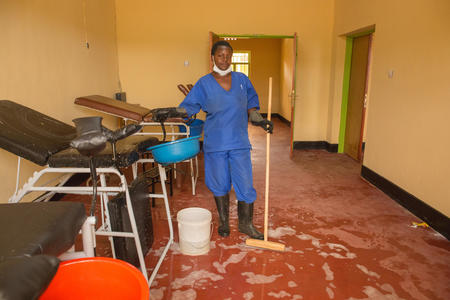The unsung heroes of the COVID-19 pandemic

Subscribe to the WASH Matters newsletter
The COVID-19 pandemic has drawn attention across the world to the vital roles of key workers such as those employed in healthcare and sanitation. We must use this opportunity to improve the often dangerous conditions they work in every day, argues Andrés Hueso.
If there is anything that has spread faster than the coronavirus during the pandemic, it has been the recognition of healthcare workers. Across the globe, people have been regularly clapping and cheering from windows and front doors to thank these key workers for their effort and courage in facing the threat of COVID-19 in their daily work. Courage that, unfortunately, borders heroism, where they lack personal protective equipment.
This well-deserved tribute should be extended to other workers who are contributing to keeping society going and all of us safe. In particular, I would like to highlight sanitation and waste workers, who keep communities’ environments clean. A halt to the services they provide would leave societies at risk of outbreaks of many other diseases. All too often lacking adequate information and personal protective equipment to keep themselves safe, their courage also borders on heroism, yet they rarely receive recognition.
Poor conditions and health risks are amplified during the pandemic
Waste and sanitation workers already faced dire working conditions before the pandemic – debilitating infections, injuries, social stigma and even death. During the pandemic, we still need their services, and they must continue to carry them out, whatever the risk, be it because of civic duty, or fear of losing daily income or the job altogether.
More work for less money
In some cases sanitation workers have even been redeployed to clean quarantine centres and tend to COVID-19 patients there.
Rajib’s story in Bangladesh is a good illustration of the situation many sanitation and waste workers are facing. Municipal waste worker in the mornings, Rajib turns private hospital cleaner in the evenings, and, occasionally, septic tank emptier. "Serving amidst a pandemic without proper safety gear is a threat to life, but I can't tolerate my family starving," he said. "Of course I do fear death, but I hate hunger the most."
The municipality both extended his working hours in a drive to increase community cleanliness and reduced his livelihood – his extra hours are unpaid, and his time for the other jobs has decreased, reducing his monthly overall income. His regular pay is also delayed, because of reduced working hours at banks and offices.
Increased exposure to disease
Sanitation workers are also at higher risk of contracting the virus. Many struggle to keep physical distance when collecting waste door to door, attending community toilets or interacting with householders to empty pits or septic tanks. Many are exposed to frequently touched surfaces that may be infected – for example, when cleaning toilets (door handles, toilets, taps) or transporting and sorting waste. Many neither are provided with nor can afford the regular supply of appropriate gloves, masks and other personal protective equipment that could mitigate those risks. Those working in hospitals and quarantine centres are probably at the highest risk, as the infection of 32 sanitation workers in a hospital in India, and the death of one of them so far, shows.
Lack of equipment and training
Further problems include access to handwashing stations; facilities for cleaning equipment; and water, soap, disinfectant or alcohol-based sanitiser.
Few have received information or training on the risks coronavirus poses and how to protect themselves and those around them. In some cases, sanitation workers are victims of more discrimination than usual, and even attacks.
This is not just a tale of poor countries. Take Chile, France, Pakistan – the story is similar across continents.
Now is an opportunity for change
But there is light at the end of the tunnel; we can also see action beginning all over the world to change the stigmatisation and safety risks sanitation workers face. For instance, sanitation workers mobilising to demand safety gear and health insurance. Households showing their kindness and appreciation to workers. Activists fundraising to distribute protective equipment. Unions and civil society networks launching a global call for action. Utilities, municipalities and national governments building on their responsibilities towards workers.
As part of these efforts, many resources have been developed:
- Advocacy-focussed articles and papers, including by WaterAid in Nepal and India.
- Guidance on how to ensure sanitation and waste workers' safety, as this compilation of Government advisories from India shows.
- Communication materials such as posters and videos – from WIEGO for waste pickers; from PASA-CAWST for pit emptiers; and from Tamil Nadu Government for various sub-types of sanitation and waste workers.
The COVID-19 pandemic is a time of heightened danger for sanitation and waste workers. It is also a time of heightened awareness, both of our dependence on these key workers for our health, and of the risks they face every day. It is a rare opportunity to put their situation in the spotlight, and work to further build the recognition and support they deserve.
We are all hoping the world that emerges after COVID-19 will be a kinder and more harmonious world. A world with more empathy and dignity. A world where workers – whether healthcare, waste, or sanitation – can do their work with safety and dignity.
Let’s all play our part in making that reality. Why not start by sharing, supporting and building on the existing initiatives and resources to support sanitation and waste workers?
Andrés Hueso is Senior Policy Analyst for Sanitation at WaterAid UK. He tweets as @andreshuesoWA





